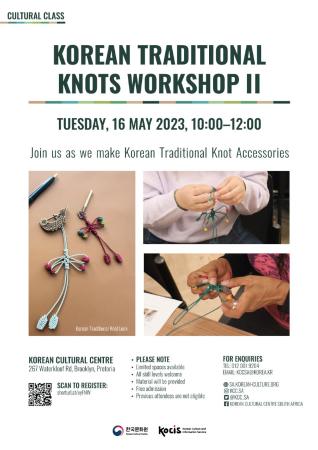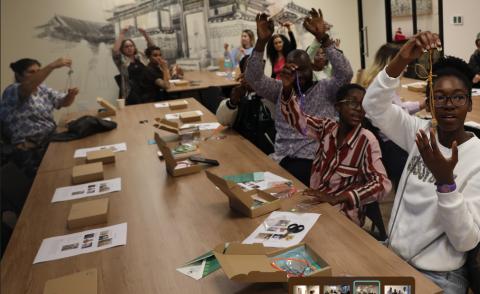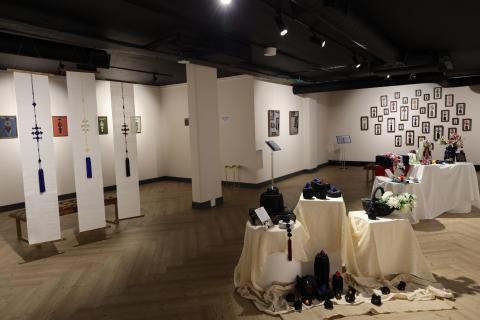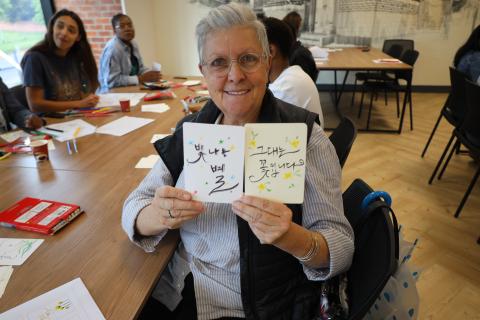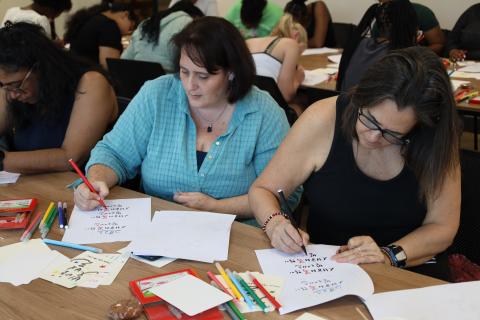Programs
-
Korean Traditional Knots Workshop II
The Korean Cultural Centre in South Africa recently organized a hands-on event on Tuesday, 16 May, dedicated to the art of traditional Korean knots—a renowned craft called gyukbang. During this event, a group of eight participants had the opportunity to learn various knotting techniques, including dragonfly knots and leaf knots. They also experienced the creation of fish-shaped locks, a traditional form of lock made using these knots. ▲ Traditional knot workshop poster ▲ Workshop participants making traditional knots One of the workshop participants, Tamia Modiselle, 23, expressed her thoughts, stating, "I find Korean traditional knots require greater concentration compared to sewing. I enrolled in this workshop to delve into the history of Korea, and I intend to share the process of creating these knots on my personal YouTube channel with my subscribers." Jane Malan, 45, another participant, echoed this sentiment, saying, "The Korean Cultural Centre in South Africa seems to be the ideal destination for anyone seeking to learn about Korean traditions." ▲Tamia Modiselle, 23, a workshop participant taking videos of her own knots ▲ Workshop participants expressing satisfaction with the knots they made This workshop served as an enlightening cultural lecture, introducing the captivating artistry of Korean handicrafts, which have been passed down through generations, to the host country.
Post Date 01.06.2023 -
Korean traditional knots workshop Event Date 17.04.2023
The Korean Cultural Centre in South Africa held a Korean traditional knots workshop on Monday, 17 April. In this workshop, participants had a two-hour experience in making traditional knots, one of Korea's representative gyubang crafts, following along through Zoom with instructor Kim Youn-Jung, the author of "Easy-Making Knot Prop." ▲ Korean Traditional Knots Workshop Poster Participants in the workshop had time to appreciate Korean Traditional Knots in the exhibition hall of the Cultural Centre and listened to explanations on the history of Korean knots and how they developed independently over thousands of years, as well as learned that Korean Traditional Knots 'Maedeup' was registered as National Intangible Cultural Heritage No. 22. ▲ Participants of the workshop admire traditional knots in the exhibition hall of the Cultural Centre ▲ Workshop participants create traditional knots while communicating with artist Kim Youn-Jung Seventeen people attended the workshop. Participants made traditional dragonfly-shaped knots by following along with instructor Kim Youn-Jung through video. "I thought it would be easy to make traditional knots because I sewed often, but it wasn't," said Anatasha Diagrala, a participant in the workshop. "It was difficult to knit with two fingers, but it was fun because I had to use all my fingers for traditional knots," said another participant, Carla. "I went to Korea a few months ago and worked as an English instructor, it was a meaningful time for me to get to know Korea more." ▲ Workshop participants showing Kim Youn-Jung the traditional knot they made This workshop was a meaningful cultural lecture and an opportunity to introduce the beautiful Korean handicraft culture to the host country.
Post Date 24.05.2023 -
Traditional knot and cloth exhibition Event Period 07.03.2023 - 31.05.2023
▲A poster for the traditional knot and cloth exhibition held by the Korean Cultural Center in South Africa The Korean Cultural Center in South Africa will hold an exhibition of traditional knots and cloths, Korea's representative gyubang crafts, from 7 March to 31 May, in the exhibition room of the cultural center. This knot & cloth exhibition will feature a total of 212 knots, including 117 knotted works by Kim Yoon-jung, author of <Easy-Making Knots Props>, and 95 works by Choi Sun-hwa, president of the Jeonbuk branch of the Korea Foam Art Association. It is no exaggeration to say that knots made by crossing more than one string three times have a long history, and Korean knots have developed independently in thousands of years of history as Important Intangible Cultural Property No. 22. It is difficult to learn from literature or relics. ▲ A panoramic view of the traditional knot and cloth exhibition Kim Yoon-jung said she would like to introduce more familiar and enjoyable knots in this exhibition. ▲ Visitors to Kim Yoon-jung's knot Aside from the simple use of square cloth made to pack and carry things, other craft cloth is expanding its scope as a practical art, as it is used as a fashion item or interior object beyond traditional packaging. In this exhibition by artist Choi Sun-hwa, a set of human birth, growth, marriage, daily life, and death expressed the use of cloth that is dissolved throughout human life from birth to death. ▲Visitors to see Choi Sun-hwa's wrapping paper Through this exhibition, we hope that it will be a meaningful exhibition to introduce the beautiful Korean handicraft culture that has been handed down for a long time to the host country.
Post Date 24.05.2023 -
Calligraphy workshop and Korean traditional games experience
The Korean Cultural Centre in South Africa held a calligraphy workshop and Korean traditional games experience on Friday, 17 February 2023. The workshop is a link to the 2022 Talk Talk Korea Global Contest <Hangeul Calligraphy Exhibition>, showcasing the winning artworks of the largest Korean Wave content contest, held under the topic: What I 'WRITE' about Korea, currently being held in the exhibition hall of the Cultural Centre. This event was created to provide an opportunity to see the winning artworks and experience calligraphy and Korean traditional games in person. ▲Calligraphy Workshop Poster After the participants enjoyed the calligraphy artworks in the exhibition hall of the Cultural Centre, they proceeded to the cultural lecture room to interact with Calligrapher Hyejin Kim from Korea. They followed along with her in real-time via Zoom and got to make four postcards over the course of 2 hours. ▲ Participants of the event making postcards while communicating with instructor Kim Hye-jin through video A total of 50 people participated in the Calligraphy and traditional games event. The workshop was so popular that registration closed within one day of the announcement of the workshop. ▲Participants satisfied with their postcards After the calligraphy workshop, participant Naomi expressed satisfaction, saying, "I became interested in Korean culture through watching K-Dramas, and this calligraphy class was beneficial. I want to participate in many cultural events such as Korean cooking classes in the future." ▲ Workshop participants showing their postcards to the teacher. After the Calligraphy workshop, the participants went to the K-Pop studio of the Cultural Centre and had the opportunity to experience various traditional Korean games such as Ttakji-chigi, Jegi-chagi, and Tuho. ▲ Participants enjoying various traditional Korean games In the future, the Korean Cultural Centre in South Africa will continue to hold various Hallyu cultural events, such as this event, to increase interest in Korea and promote Korea's image.
Post Date 24.05.2023 -
Calligraphy workshop
The Korean Cultural Centre in South Africa held a calligraphy workshop on Thursday, 26 January 2023. This workshop is a link to the 2022 Talk Talk Korea Global Contest <Hangeul Calligraphy Exhibition>, showcasing the winning artworks of the largest Korean Wave content contest, held under the topic: What I 'WRITE' about Korea, currently being held in the exhibition hall of the Cultural Centre. This workshop was created to provide an opportunity to see the winning artworks and experience calligraphy in person. ▲Calligraphy workshop poster After the participants enjoyed the calligraphy artworks in the exhibition hall of the Cultural Centre, they moved to the cultural lecture room to interact with Calligrapher Hyejin Kim from Korea, who has been teaching calligraphy for seven years. They followed along with her in real-time via Zoom and got to make five postcards over the course of 2 hours. ▲ Workshop participants making postcards while communicating with Calligrapher Kim Hye-jin through Zoom. The calligraphy workshop was very popular, with a total of 30 people participating. The workshop consisted of drawing lines with a calligraphy brush pen, writing Korean letters, and decorating by drawing pictures. ▲ Workshop participants happy with their postcards After the calligraphy workshop, Vimla Frank, a participant, asked where she could learn Korean, saying, “I want to learn Hangeul professionally because the characters are so beautiful.” In the future, the Korean Cultural Centre in South Africa will continue to hold various Korean Wave cultural events, such as this workshop, and communicate closely with the locals to raise interest in Korea and promote Korea's image. ▲ Workshop participants showing their postcards to the teacher.
Post Date 24.05.2023

